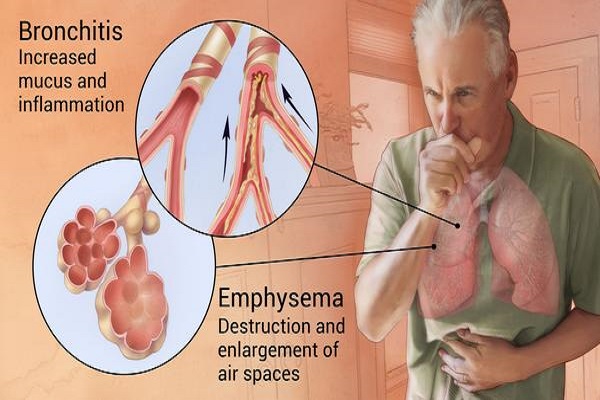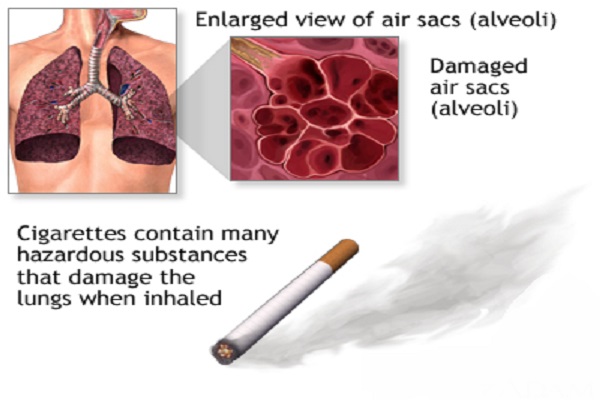Smoking is the leading cause of chronic obstructive pulmonary disease (COPD). Smoking is also a trigger for COPD flare-ups. Smoking damages the air sacs, airways, and the lining of your lungs. Injured lungs have trouble moving enough air in and out, so it's hard to breathe.
Information
Chronic obstructive pulmonary disease (COPD) is a growing problem worldwide and a major cause of disability, hospital admission and premature death). It is projected to become the third most common cause of death by the year 2020. From the patient’s perspective, it is also a disease that has a profound effect on quality of life. COPD is an umbrella term used to describe a number of lung conditions that obstruct airflow and make breathing difficult.
COPD - Overview
Chronic obstructive pulmonary disease (COPD) is the name for a group of lung conditions that cause breathing difficulties. COPD is a chronic inflammatory lung disease that causes obstructed airflow from the lungs. Symptoms include breathing difficulty, cough, mucus (sputum) production and wheezing. It's caused by long-term exposure to irritating gases or particulate matter, most often from cigarette smoke. People with COPD are at increased risk of developing heart disease, lung cancer and a variety of other conditions.
It includes:
- emphysema – damage to the air sacs in the lungs
- chronic bronchitis – long-term inflammation of the airways

COPD is a common condition that mainly affects middle-aged or older adults who smoke. Many people do not realize they have it. The breathing problems tend to get gradually worse over time and can limit your normal activities, although treatment can help keep the condition under control.
COPD is treatable. Treatment is much more efficacious in the early stages of disease. With proper management, most people with COPD can achieve good symptom control and quality of life, as well as reduced risk of other associated conditions.
The symptoms of COPD include:
- a persistent cough that produces a lot of mucus
- shortness of breath, especially during exercise
- a wheezing sound while breathing
- a barrel-chest deformity
- tightness in the chest
COPD can lead to serious complications. You should go to the emergency room right away if you have any of the following symptoms:
- difficulty talking or breathing
- blue or gray fingernails or lips
- a lack of mental alertness
- a very rapid heartbeat
- severe COPD symptoms that get worse despite treatment
Smoking is the leading cause of chronic obstructive pulmonary disease (COPD).
Smoking is also a trigger for COPD flare-ups. Smoking damages the air sacs, airways, and the lining of your lungs. Injured lungs have trouble moving enough air in and out, so it's hard to breathe.
Cigarettes contain many hazardous substances that damage the lung when inhaled, including tar, nicotine, carbon monoxide, and cyanide. Long-term exposure to secondhand tobacco smoke and/or repeated respiratory infections also can increase a person's risk for chronic obstructive pulmonary disorder.
You do not have to be a smoker for smoking to cause harm. Exposure to someone else's smoking (called secondhand smoke) is also a trigger for COPD flare-ups.
Smoking damages your lungs. When you have COPD and smoke, your lungs will get damaged more rapidly than if you were to stop smoking.

What to do to detect chronic obstructive pulmonary disease?
Currently, City International Hospital applies the intensive obstructive lung disease screening package (COPD) & lung cancer by the following methods:
- Examining and exploiting medical history from specialists.
- Measurement of respiratory function
- CT scan does not contrast.
Specialist Internal Respiratory Specialist City International Hospital recommends that smokers who are constantly exposed to polluted environments need to make lifestyle changes that can reduce COPD symptoms: quit smoking; avoid cigarette smoke and air pollution places; a diet enriched with vegetables, lean fish and grains; exercise regularly every day
The combination of medical measures and lifestyle adjustments can slow the progression of COPD and reduce the severity of symptoms. The best way to prevent COPD if you haven't already, or prevent COPD from getting worse is to quit smoking immediately and avoid cigarette smoke.
Screening for Chronic Obstructive Pulmonary Disease
Screening can be done by asking about smoking history and environmental or occupational exposure. In high-risk populations a screening spirometry should be obtained to document airway obstruction. Some experts advocate conducting screening spirometry in all patients with findings compatible with emphysema on chest x-ray or computed tomography of the chest. Significant pulmonary dysfunction may be present in asymptomatic smokers.
For appointment or more information about the services provided by the department, please contact:
Internal Medicine Department
- Nurse Station: (8428) 6280 3333, ext. 8241
- Patient service: (8428) 6280 3333, ext. 8330
City International Hospital
- Operator: (8428) 6280 3333, ext. 8035 or 8036
- Address: No. 3, 17A Street, Binh Tri Dong B Ward, Binh Tan Dist. (Next to AEON Mall Binh Tan). Ho Chi Minh City.
- Website: https://cih.com.vn/en/
- Email: This email address is being protected from spambots. You need JavaScript enabled to view it.










